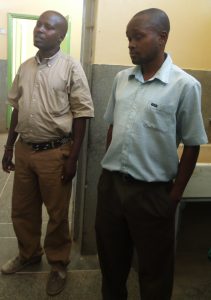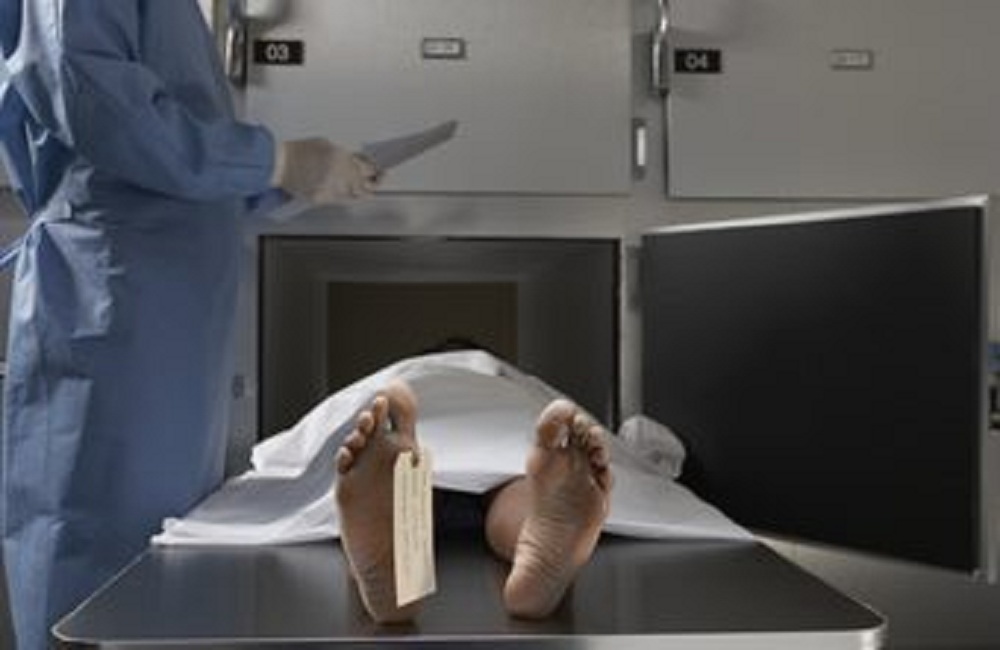[dropcap]I[/dropcap]n many African cultures, death and the dead are feared and revered, and the sheer mention of a mortuary, a house where the dead are kept before their burial sends a collective shiver down the spine of many people.
Being a mortuary attendant is a job that most people abhor despite the joblessness that engulfs the country but one man has been working in a morgue for 11 years and for him, things can only get better. Mortuary attendants work in hospitals, mortuaries, funeral homes and county coroner offices.
Meet 42-year-old Leshan Lontubu; a Mortuary Superintendent (in charge) at Narok Referral Hospital mortuary and the second born in a family of six, when he was young he wanted to be a pilot or a doctor but things did not go his way. He got this job after completing his Form Four and later went on to study a certificate course in mortuary science at Chiromo campus of the University of Nairobi.
To him, the job is a calling and just not an ordinary like any other. Leshan says he loves his work of a mortuary attendant so much and could have asked for more since it was his choice.
Being a mortuary attendant, Leshan`s job entails receiving the bodies in the morgue, cleaning the bodies, labeling them properly for identification and preparing them for preservation by applying various chemicals required for the purpose and ensuring that the bodies are properly stored in the refrigerator.
Handling the dead
He also prepares the bodies for postmortem and is required to be physically present to help the pathologist bisect the body to determine the cause of death and then take back the body for preservation after postmortem.
As the mortuary Superintendent the Hospital mortuary, Leshan is also required to complete the necessary paper work to receive and release the body to the relatives or to any other person if there is a court order. “You see, in this country there are laws that govern how you handle and interact with the dead,” he says.
ALSO SEE: The worst jobs in Kenya are actually the most popular
He says working with the dead gives him satisfaction to help honour the departed and give them their last respects. He says he even sits with his family and advices them as a father to follow his footsteps, adding that it’s a job like any other.
Emotional job
But jokes that all long, his family has never been comfortable with his choice of job but later came to accept his choice and support him.
Mortuary attendants other than high school certificate or general education are required to have at least a diploma in mortuary science and can advance this to a degree or beyond. In this country, University of Nairobi is the only institution known to offer this course up to the highest level at its Chiromo Campus.
Being an emotional job, mortuary attendant is required to maintain composure in the face of extremely difficult circumstance. Physical fitness is necessary, as is attention to details. Most mortuary attendants training is learned on the job. If you plan to become a funeral director or, you will need a four-year degree in mortuary science.
Leshan says he is married and blessed with two boys and one girl who support and value his job. He says one of the challenges they face is when they get bodies that have gone very bad or unknown bodies that are difficult to identify before the postmortem is done, which could due to being disfigured in an accident or fire, for example.
“In this case, genetic tests called DNA is done on samples from the bodies and from those claiming the bodies,” says Leshan.
There are many stereotypes being propagated about people who work in a morgue. One of the myths is that a mortuary attendant must be an alcoholic or a drug addict but Leshan dismisses this saying they serve people who are not happy but sad people so one must be sober in order to help them deal with the loss.
Stigmatised
He says serving people who have lost their loved ones also affects him as a human being so most of the time he is not in a happy mood. “It’s a job that requires one to be in a sober mind in order to help detect the causes of the death of a patient and he even becomes bitter about these myths being spread about mortuary attendants,” Leshan says.
Leshan says some people claim the mortuary attendants are not human beings otherwise how can one live and work in an environment full of dead bodies but he says contrary to this belief mortuary attendants are human beings with feelings and theirs is a job just like any other.
He says as a mortuary attendants, they are stigmatised and even when walking on the streets, many people don’t want to associate with him and some are even heard saying, ‘that is the mortuary guy’.

Leshan also says people have a myth that a person working in a morgue can communicate with the dead, adding that this is very wrong as no human being can communicate with the dead.
Another myth is that people believe people who are brought in the morgue and are not dead are killed by the mortuary attendant, an allegation that Leshau categorically denies.
He says that mortuary attendants are also human beings with feeling and besides the bodies are normally confirmed and certified dead through a number of tests carried out just to be sure that indeed they are dead.
READ: Mother who killed son for Sh20
Leshau also says when body is brought to the morgue, its refrigerated after three hours and this is just in case the person is found to be alive which has never occurred, but just in case it occurs, a doctor is required to be called in immediately and the patient is taken to a ward at the hospital for assistance but the matter is kept confidential.
He views his work with dead bodies as a calling and contrary to myth that people who work in a morgue experience nightmares, Leshau has never had any nightmare. “When I’m out of the morgue, I forgets everything that has happened that day and concentrates on his family,” Leshau says.
Leshan says members of the public should be sensitised about careers such as his because young people are shying away from these kind of careers because of misconceptions and very soon, such careers will not have the necessary manpower to run them and yet they are careers like any other and are important to the society.
“Imagine a world without mortuaries, or mortuaries without the people who work in there,” Leshan says.
Many youth engage in activities which ruin their lives after becoming desperate to get a job and make a living but Leshau advises every jobless youth not to be too selective in career choice and should consider a career in Mortuary Science which is grossly understaffed and afterwards be counseled and sensitized on the issue of death.
Just like any other job, mortuary attendants face a number of challenges; handling people who are in pain by trying to fit in their shoes is a bit difficult as Leshan has found which is a bit difficult.
Overstretched facilities
He recalls one particular incident where he was dealing with family members who were too traumatised after losing several members in an accident and he had to understand and communicate to them though a family spokesman.
Narok Referral Hospital Mortuary where Leshan works was built to serve only the hospital but it serves the whole county and as a result, the facilities are overstretched thus increasing the workload for the mortuary attendants who are there.
Related: Autopsy reveals Chris Msando’s painful death
The work load is too high as there are only two mortuaries in county, one at Kilgoris District Hospital and the one at Narok Referral hospital where Leshau works. Because of the failure of ordinary wananchi to take up such jobs Leshau and his colleagues are overworked.
Leshan, for instance, is thinking about going to further his studies but he cannot be released because there is no replacement. And the community needs him. Facilities too, are not adequate and one can easily contract a disease in the morgue, but luckily, this has never happened to him.
Leshan says in his career he has observed that people fear the dead and would like to further his studies in order to educate and sensitize the public about Mortuary Sciences and other careers which are grossly misunderstood. He advises young people to take on this job as a career as it is a job just like any other.











Leave a comment